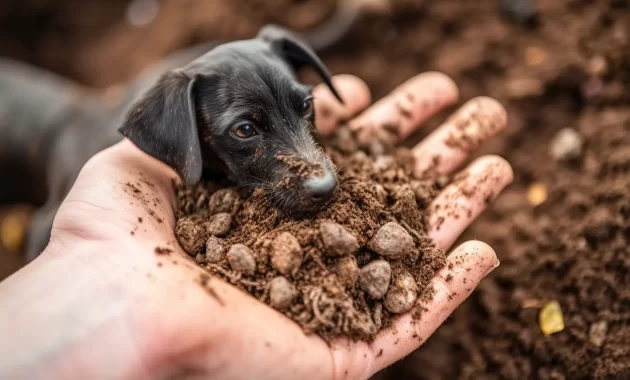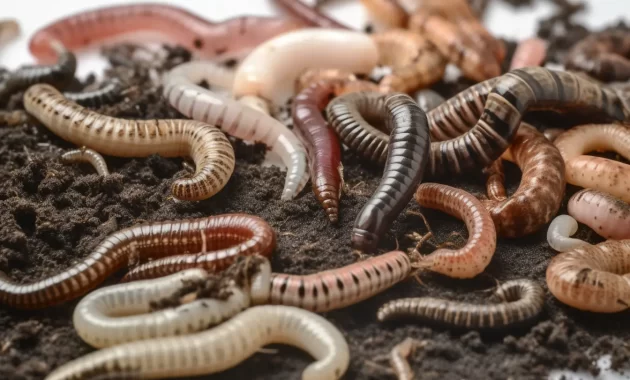
Hi there! It’s a pleasure to explain why your pup may have worms in their poop.
As a veterinarian, I understand the concern that pet owners have when it comes to the health of their furry friends.
So let’s dive into what could be causing those unsightly parasites in your pup’s business.
Seeing worms in your pup’s poo can be alarming, often leaving pet parents confused and overwhelmed.
But don’t worry – understanding why this might happen is quite simple!
In this article, we’ll look at the common causes of worms in dogs and how you can help your pup get back to feeling its best.
Table of Contents
- Common Types Of Worms In Dogs
- Symptoms Of Worms In Dogs
- Causes Of Worms In Dogs
- Diagnosing Worms In Dogs
- Treating Worms In Dogs
- Frequently Asked Questions
- Conclusion
Common Types Of Worms In Dogs

It is not uncommon for pet owners to find worms in their dog’s poop, which can cause worry. According to the Centers for Disease Control and Prevention, up to 10% of dogs may have worms at any time.
As veterinary technicians or assistants, we provide prevention methods for clients concerned about their pet’s health.
The most common types of worms found in dogs include:
- roundworms
- hookworms
- whipworms
- tapeworms
Each type has its symptoms, such as vomiting or diarrhea, but all can be treated with deworming products available from your veterinarian.
Depending on the type of worm present, your vet may also recommend additional testing or treatments.
It is essential to know that not all worms are visible in the stool, so regular fecal tests should be performed on your pet at least once per year.
Regular checkups and preventive measures will help ensure the long-term health of your beloved pet.
Symptoms Of Worms In Dogs

As a veterinary technician or assistant, one of the most common questions I receive from pet owners is why their beloved pup has worms in their poop.
This can be alarming; however, it’s essential to understand that intestinal parasites in dogs are widespread and preventative care can help reduce the risk of worm infestations.
| Symptom | Description | Prevention |
|---|---|---|
| Weight loss | Loss of appetite, noticeable thinness with ribs visible | Regular dewormer treatments and checkups with your vet |
| Vomiting & Diarrhea | Keep your dog away from areas where other animals may have been defecating, and clean up after your pet accordingly. Have them tested regularly for parasites. | Feeding them a high-quality diet and proper grooming can help prevent any issues related to their coat. Regular vet visits will also help identify any signs of parasites early on. |
| Dull coat/itchy skin | A dull coat and excessive itching may be caused by an infestation of worms which can affect their skin’s health leading to hair loss. | Feeding them a high-quality diet and proper grooming can help prevent any issues related to their coat. Having regular vet visits will also help identify any signs of parasites early on. |
RIt’secognizing these symptoms as quickly as possible is essential to prevent further health problems.
As such, it’s highly recommended that you investigate potential causes immediately should they arise.
Make sure you practice preventive care by scheduling regular checkups at the vet and administering dewormer treatments when needed; this will go a long way towards keeping your pup healthy and parasite free!
Causes Of Worms In Dogs
The presence of worms in a dog’s stool is often a cause for concern for pet owners.
While the issue can be incredibly problematic, it is essential to understand that worms in dogs are prevalent, and there are ways to prevent them from occurring.
You can help keep your beloved pup healthy and worm-free with a few dietary changes and regular deworming.
Various parasites, such as roundworms, hookworms, tapeworms, whipworms, and more, can cause dog worms.
These parasites enter the body by contacting contaminated soil or water or ingesting infected fleas or other animals.
Keeping your pet away from areas containing these parasites is one way to help prevent infection.
In addition to avoiding potential sources of infection, it is also essential to ensure your pet has access to proper nutrition and regular deworming treatments from your veterinarian.
Adjusting their diet may also help reduce the risk of infection; adding foods high in fibre and vitamins A and C may help strengthen their immune system and make them less susceptible to worm infestations.
These preventive measures will help ensure your pup stays healthy and happy for years!
SEE ALSO
How You Can Tell If Your Border Collie Has Mental Problems
What Cavalier King Charles Spaniel Owners Need to Know About Their Dogs’ Health Before Bringing Them Home
Diagnosing Worms In Dogs
Now that we understand the causes of worms in dogs, let’s move on to diagnosing them. Diagnosing worms can be complicated and requires a veterinarian to accurately identify the animal’s species, sizes and type of worm present.
The first step is for the vet to take a history of your pet and perform an examination.
Your vet may then recommend one or more tests, depending on the suspected type of worm involved. Fecal exams are usually recommended as they provide information about the number and types of parasites in your pet’s intestines.
This can be done through a fecal smear or flotation test, which involves looking at stool samples under a microscope for evidence of eggs and larvae.
Another diagnostic tool used is serology testing, which looks for specific antibodies in your pet’s blood that indicate past or current exposure to certain parasites.
It’s also important to remember that preventing worms in your dog is vital. Practising good hygiene, such as washing your hands after playing with or handling your dog, can help minimize the risk of infection for you and your pet.
Additionally, routine deworming protocols are recommended by most veterinarians to reduce the chances of infestation from common parasites like hookworms and roundworms.
Treating Worms In Dogs
As a veterinary technician or assistant, it is essential to be aware of worms in your dog’s poop. If you notice any signs of worms, you should take your pup to the vet for a checkup.
Treatment for worms will depend on what kind of parasites are present and the severity of the infestation.
Preventative care is critical when it comes to parasite control in pets.
Ensure your pup receives regular deworming treatments and annual checkups at the vet. Ask your vet which type of dewormer they recommend based on your pup’s size and lifestyle.
Additionally, keep up with grooming habits like nail trimming and teeth brushing to prevent unwanted parasites from entering your pet’s body.
It’s also important to note that certain environmental factors can increase the risk of worm infestation in dogs.
Be sure you’re taking necessary precautions like regularly cleaning up after them outside, avoiding areas known for having high levels of parasites and keeping them away from other animals carrying worms.
Following these tips can help keep your pup happy and healthy!
Frequently Asked Questions
How Do I Prevent My Dog From Getting Worms?
When it comes to preventing worms in your dog, vaccinations are essential.
However, even if your pup is up-to-date on their vaccinations, there are still steps you can take to protect them from parasites.
A vet tech or assistant can recommend the best parasite prevention methods for your pup’s needs.
These might include flea and tick medication, heartworm preventatives, or a special diet that helps keep unwanted guests away.
Your furry friend is worth the extra effort – after all, keeping them healthy and worm-free is what we’re here for!
Are There Any Long-Term Effects Of Worms On My Dog?
While intestinal damage and a weakened immune system are long-term risks of a worm infestation in your dog, there are steps you can take to prevent them.
If you spot worms in your pup’s poop or they’re exhibiting signs of an infection, don’t hesitate to get them checked out by a vet.
Treatment is typically straightforward and quick, but if left untreated can have serious long-term effects.
Talk with your vet about the best preventative measures for reducing your pup’s risk of contracting worms.
Is There A Natural Way To Treat Worms In My Dog?
Regular deworming is the best way to keep your pup’s intestines free of parasites.
As a veterinary technician, I recommend natural methods for treating dog worms, such as herbs and probiotics.
Herbal treatments have been used to help expel worms from the body and can be purchased from your veterinarian or online.
Probiotics are great for supporting gut health and can help keep intestinal parasites at bay.
If you choose these natural methods, consult your vet first – they’ll know exactly what’s best for your furry friend!
How Often Should I Check My Dog For Worms?
Regularly checking for worms should be part of your routine when caring for your pup.
Deworming your dog regularly is the best way to prevent internal parasites, and keep an eye out for any signs or symptoms that may indicate they have worms.
Having them undergo stool tests will also help diagnose parasites in their system.
We recommend that you check your dog for worms at least every six months but talk to your vet if you’re ever concerned about their health.
Are There Any Home Remedies For Worms In My Dog?
If you’ve noticed worms in your pup’s poop, don’t panic. While taking action I essential, some simple home remedies may help with the infection.
First and foremost, make sure to keep up with your pup’s intestinal health. This includes providing them with a balanced diet and plenty of fresh water.
Additionally, regular deworming treatments can help prevent infections in the future.
Finally, adding a herbal supplement such as black walnut or garlic into their diet is a great way to naturally boost their intestinal health and reduce the chance of worm infestation.
Conclusion
In conclusion, dealing with worms in your dog’s poop can be a stressful experience.
It’s essential to take preventative measures to protect your pup from getting worms by following the advice of your veterinarian or veterinary technician.
Regular checkups and proper nutrition are vital to keeping your dog healthy and worm-free.
Symbolically speaking, when we see worms in our dog’s poop, it’s like a reminder that we need to remain vigilant about their health and well-being.
We must nurture our furry friends just like they nurture us – with unconditional love and care.
As their owners, it’s our responsibility to ensure that they stay healthy, happy and free of parasites.




